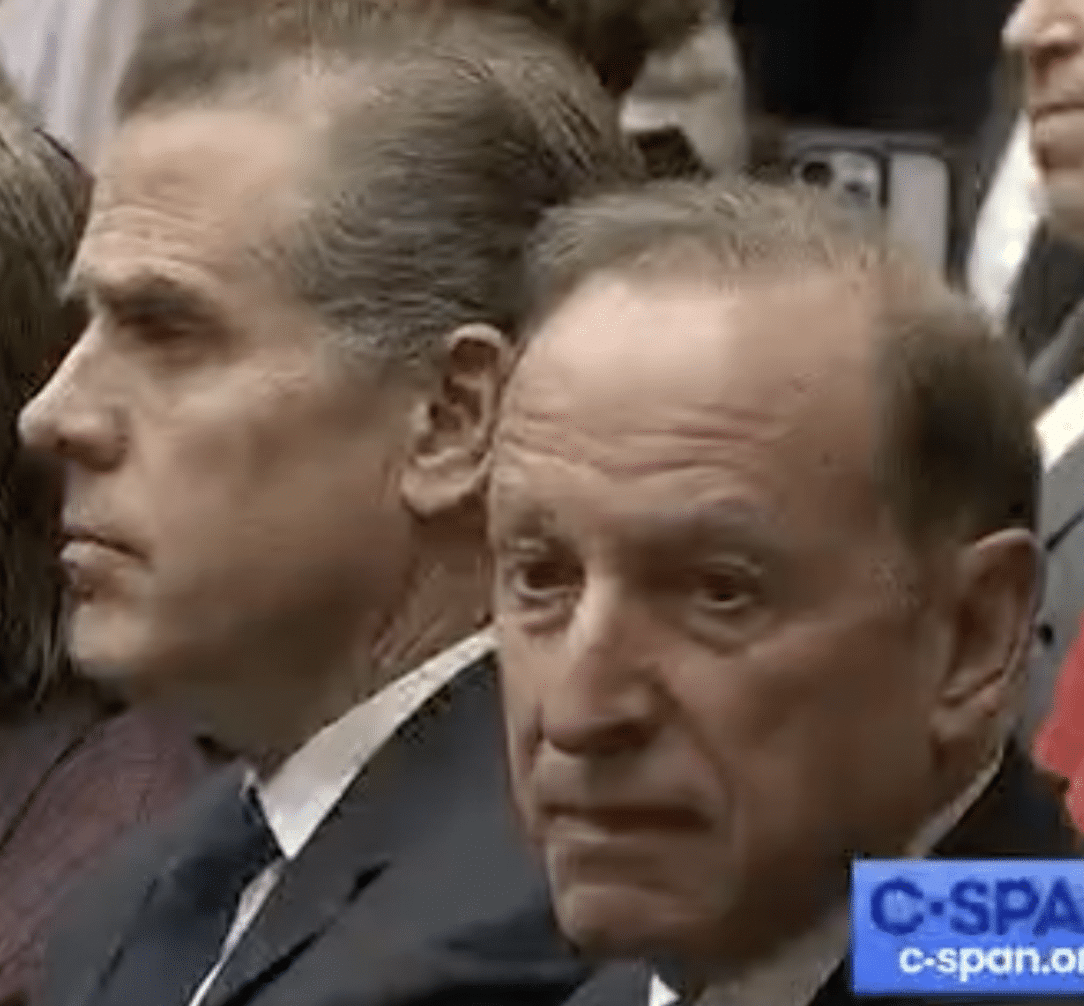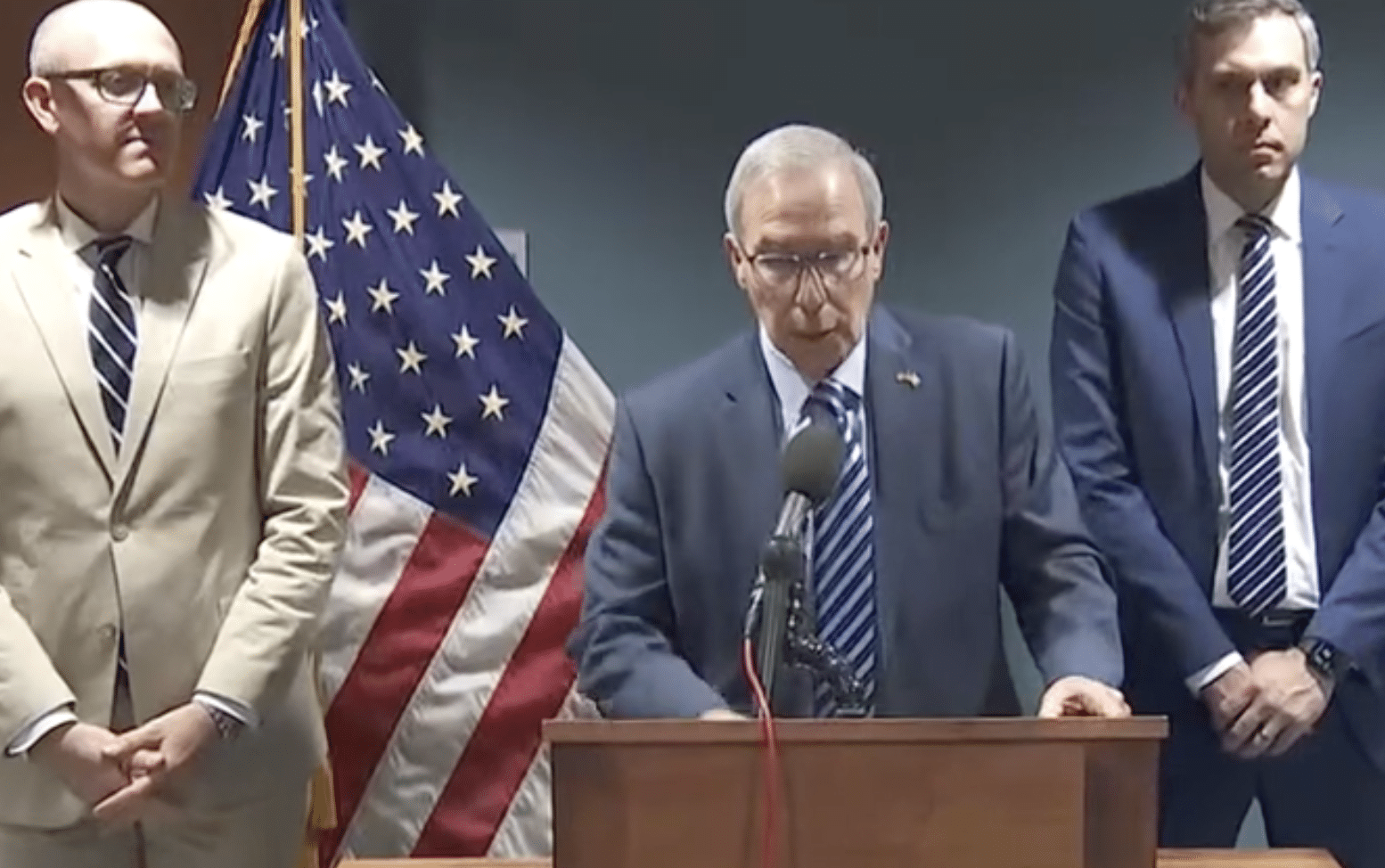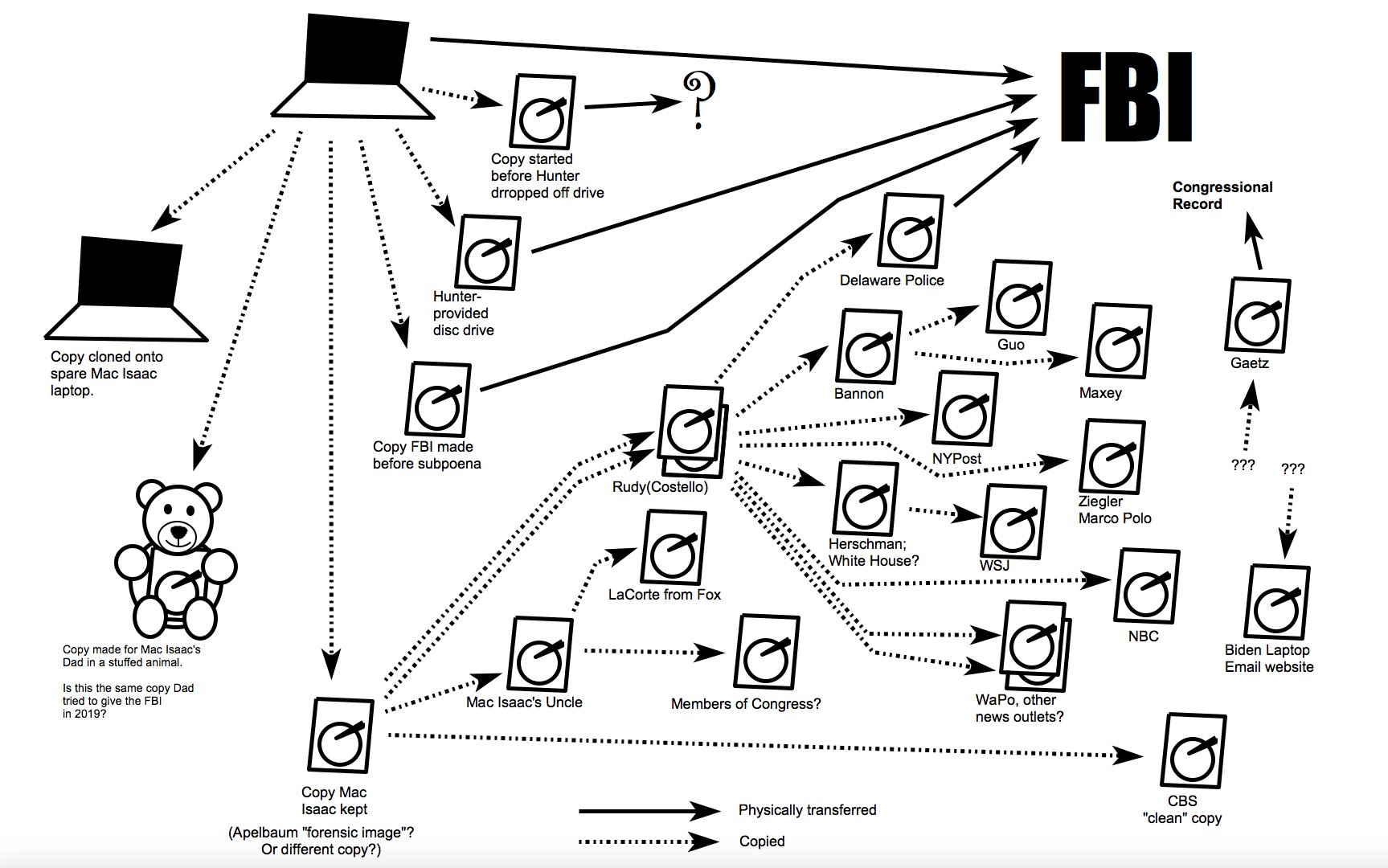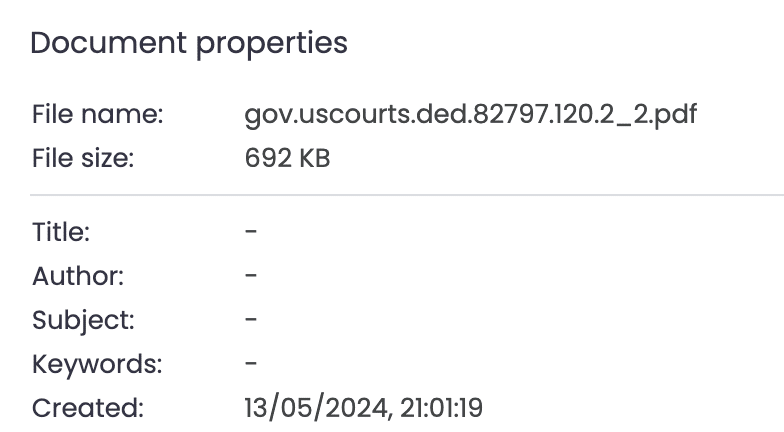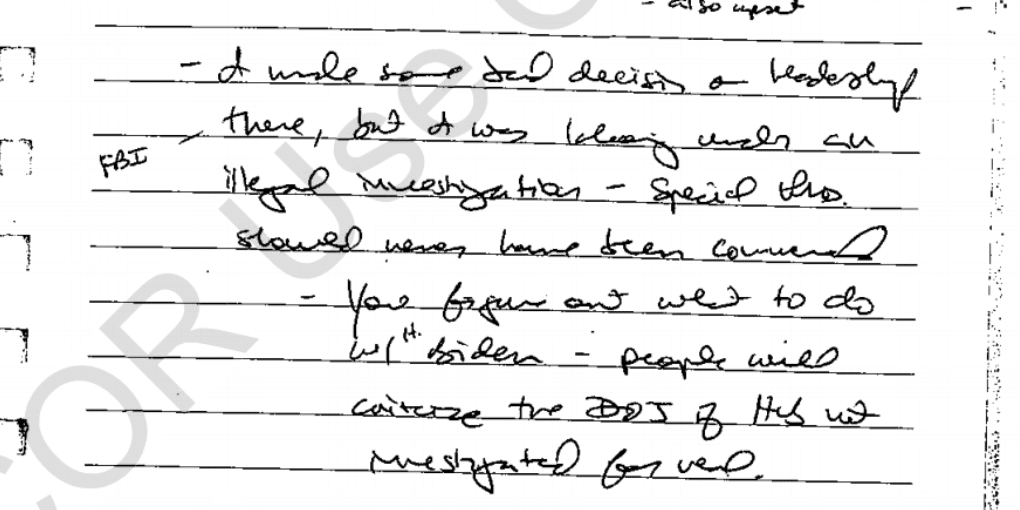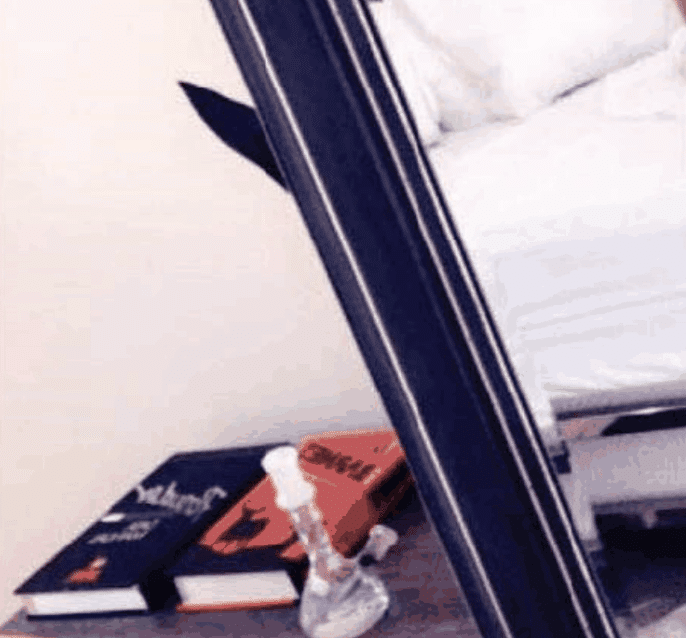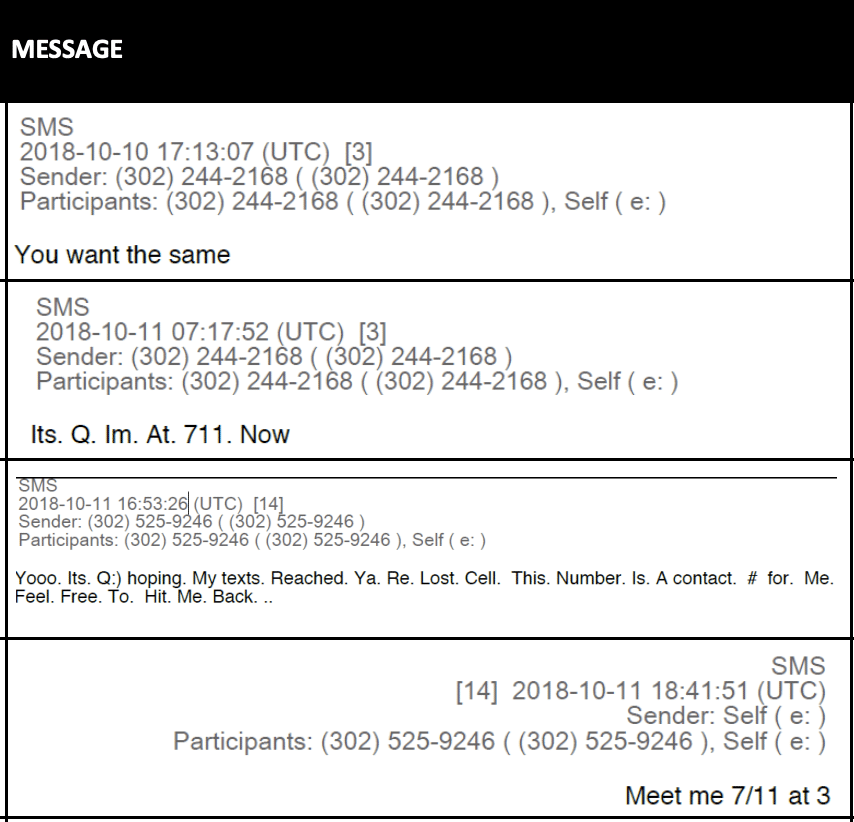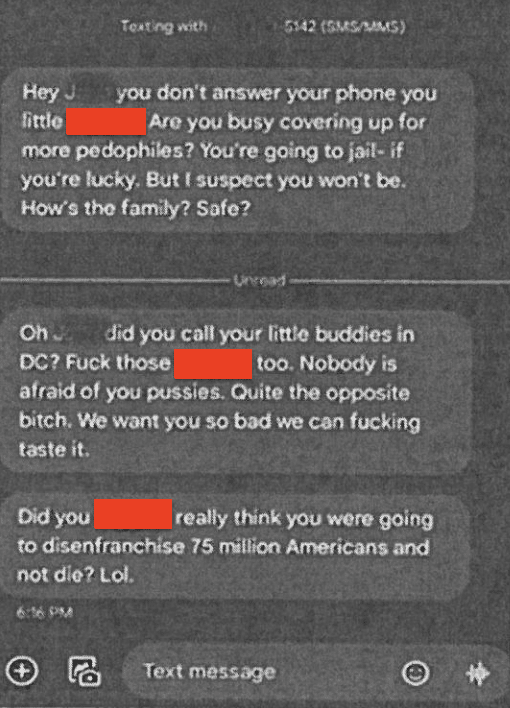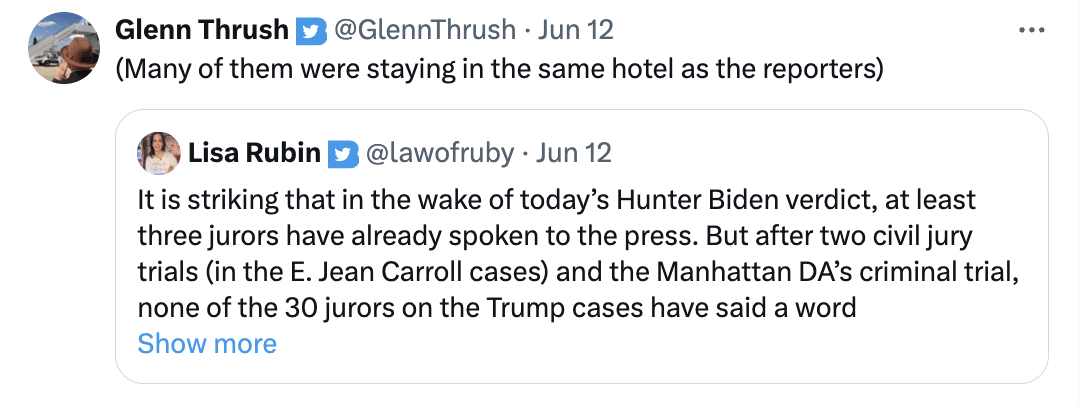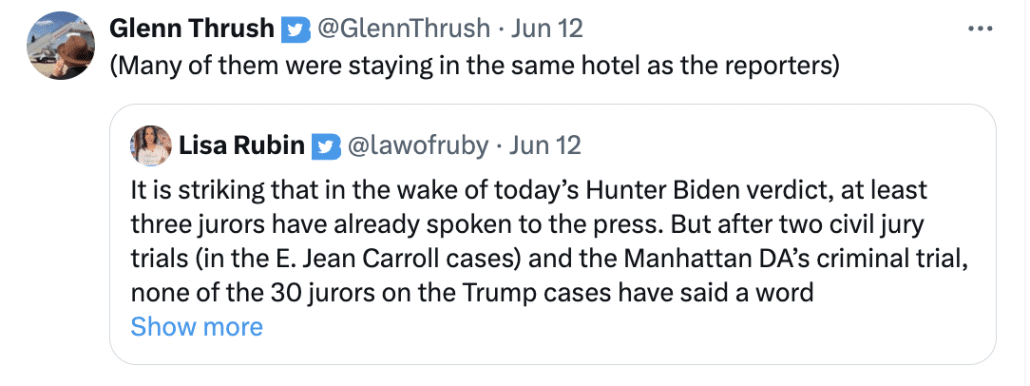Judge Mark Scarsi’s Umbrage: Do Not Go Gentle into that Good Night
I think that Hunter Biden’s two prosecutions are gone. After he submitted notice of a pardon and David Weiss’ prosecutors complained, Judge Maryellen Noreika issued an order terminating all proceedings.
ORAL ORDER: Having reviewed the parties’ submissions (D.I. 272, 274, 276 ) and in the absence of binding precedent and whereas pursuant to the Executive Grant of Clemency signed by President Joseph R. Biden, Jr. on December 1, 2024, Defendant Robert Hunter Biden has been pardoned for, inter alia, the offenses for which a jury rendered a verdict in this case (D.I. 275 ), IT IS HEREBY ORDERED that all proceedings in this case are hereby terminated. ORDERED by Judge Maryellen Noreika on 12/3/2024.
Judge Mark Scarsi … did something else. He issued a blistering opinion suggesting Hunter’s pardon was partly defective (because the President issued the pardon through the day he issued it, suggesting it attempted to grant four hours of prospective immunity), but that he would terminate the case once someone from the Executive Branch gave him a certified copy of the pardon. Mostly, though, Scarsi accused President Biden of impugning him personally and rewriting history by claiming that Hunter was prosecuted only because he was Joe’s son.
According to the President, “[n]o reasonable person who looks at the facts of [Mr. Biden’s] cases can reach any other conclusion than [Mr. Biden] was singled out only because he is [the President’s] son.” But two federal judges expressly rejected Mr. Biden’s arguments that the Government prosecuted Mr. Biden because of his familial relation to the President. (Order on Mots. to Dismiss 32–55); Mem. Opinion 6–19, United States v. Biden, No. 1:23-cr-00061-MN (D. Del. Apr. 12, 2024), ECF No. 99. And the President’s own Attorney General and Department of Justice personnel oversaw the investigation leading to the charges. In the President’s estimation, this legion of federal civil servants, the undersigned included, are unreasonable people.
In short, a press release is not a pardon. The Constitution provides the President with broad authority to grant reprieves and pardons for offenses against the United States, U.S. Const. art. II, § 2, cl. 1, but nowhere does the Constitution give the President the authority to rewrite history.
This is why I would have preferred Biden not have pardoned his son — because I wanted these verdicts, including Scarsi and Noreika’s rulings that Hunter wasn’t selectively or vindictively prosecuted, to be appealed to judges less intemperate than Scarsi.
Not least because there are several problems with Scarsi’s rant.
First, Scarsi, Weiss’ prosecutors, and Noreika (in her original opinion) are all engaged in navel-gazing. All argued, to one degree or another, that this prosecution could not be political because Biden and his selected Attorney General oversaw it. There were enormous problems with that argument: the degree to which Biden’s adversary was permitted to elicit threats against the prosecutorial team, the unwise retention of David Weiss for a second term, the role that Alexander Smirnov’s alleged attempt to criminally frame Joe Biden played in David Weiss’ decision to first obtain Special Counsel status and then ratchet up charges against Joe Biden’s son. But ultimately, prosecutors argued and judges adopted the claim that because Joe Biden was in charge, the prosecution could not have been political.
But since all that went down, John Roberts rewrote history and vested all the authority over prosecutions in the executive power of the President.
Investigative and prosecutorial decisionmaking is “the special province of the Executive Branch,” Heckler v. Chaney, 470 U. S. 821, 832 (1985), and the Constitution vests the entirety of the executive power in the President, Art. II, §1
[snip]
The indictment’s allegations that the requested investigations were “sham[s]” or proposed for an improper purpose do not divest the President of exclusive authority over the investigative and prosecutorial functions of the Justice Department and its officials.
Under Roberts’ logic, if the President, exercising his executive authority at its zenith, deems this prosecution political, then it was.
Moreover, Scarsi wildly misrepresents the nature of Biden’s comment. The legal opinions that Scarsi cites address whether Hunter’s case met the very narrow legal definitions of selective or vindictive prosecution, as he himself laid out.
Proving selective prosecution “is particularly demanding.” Reno v. Am.-Arab Anti-Discrimination Comm., 525 U.S. 471, 489 (1999). Because “[a] selectiveprosecution claim asks a court to exercise judicial power over a special province of the Executive,” “in the absence of clear evidence to the contrary, courts presume that [prosecutors] have properly discharged their official duties.” Armstrong, 517 U.S. at 464 (internal quotation marks omitted).
[snip]
“Particularly when a vindictiveness claim pertains to pretrial charging decisions, the Supreme Court urges deference to the prosecutor. Deference is appropriate for pretrial charging decisions because, ‘in the course of preparing a case for trial, the prosecutor may uncover additional information that suggests a basis for further prosecution.’” United States v. Brown, 875 F.3d 1235, 1240 (9th Cir. 2017) (citation omitted) (quoting Goodwin, 457 U.S. at 381). “[J]ust as a prosecutor may forgo legitimate charges already brought in an effort to save the time and expense of trial, a prosecutor may file additional charges if an initial expectation that a defendant would plead guilty to lesser charges proves unfounded.” Goodwin, 457 U.S. at 380. Thus, “in the context of pretrial plea negotiations vindictiveness will not be presumed simply from the fact that a more severe charge followed on, or even resulted from, the defendant’s exercise of a right.” Gamez-Orduno, 235 F.3d at 462 (citation and internal quotation marks omitted).
Deference to the prosecutorial decision to bring charges, notwithstanding significant pretrial negotiations between the parties to avoid them, is warranted.
Of course, once you adopt Roberts’ logic, then if the President overrides the original prosecutorial judgment of prosecutors, then his view must hold sway. If President Biden says the decisions were unfair, then they were.
Sure. That’s wildly problematic. Welcome to Roberts’ Calvinball.
But as Barb McQuade laid out, whether a prosecutorial decision meets the very narrow definition of selective or vindictive prosecution and whether a prosecution was an unwise exercise of prosecutorial discretion are two different things.
I disagree with McQuade about whether there was evidence of selective or vindictive prosecution. After all, as I noted, Scarsi misrepresented what the record on the comparator of Roger Stone said. Again, that’s why I wanted these cases to be appealed.
But it is also the case that a whole series of events related to this prosecution — Trump’s demand for such an investigation from both Volodymyr Zelenskyy and publicly, DOJ’s laundering of dirt Trump’s personal lawyer obtained, including from a known Russian agent, into this case, efforts by Trump’s debate guest to introduce misleading evidence into this investigation, the way a key witness in the gun case leaked information to affect the 2020 election, and Bill Barr’s subsequent pressure for a prosecution — that were excluded from both judges’ rulings altogether. Both judges simply ignored that David Weiss reneged on his assurances to Hunter’s team that there was no ongoing investigation before he entered into the deal, a detail that was central to any vindictive prosecution analysis. Neither judge addressed how Alexander Smirnov’s alleged attempt to criminally frame Biden himself played into the prosecutorial decisions (I am not sure that was formally before Scarsi, though it was before Noreika).
So while it is a fact that two judges credited the arguments made by prosecutors whose claims Biden has now overridden on the selective and vindictive prosecution issue, it is also a fact that a great deal of evidence of politicization was excluded from all consideration. Biden’s judgment incorporated a great deal of things specifically and surgically excluded from the selective and vindictive prosecution analysis.
Finally, though, there are the ways that Scarsi himself rewrote history to get to his selective and vindictive prosecution decision.
As I laid out here, Scarsi made much of errors that Abbe Lowell made in his selective and vindictive prosecution argument. For example, after pointing out that Lowell misquoted coverage of David Weiss’ comments about threats elicited by political pressure on the case, Scarsi simply ignored the role of threats on prosecutorial decisions, because those “significant threats” were not publicly described as death threats. Importantly, as Noreika did in her opinion, after (correctly) catching Lowell misstating the timeline, Scarsi himself fiddled with the timeline so as to permit himself only to look at the prosecutorial decision in December 2023, not the decision to renege on the plea agreement in June and July 2023.
Scarsi’s treatment of this passage from Hunter’s motion deserves closer consideration:
Mr. Biden agreed to plead guilty to the tax misdemeanors, but when the plea deal was made public, the political backlash was forceful and immediate. Even before the Delaware court considered the plea deal on July 26, 2023, extremist Republicans were denouncing it as a “sweetheart deal,” accusing DOJ of misconduct, and using the excuse to interfere with the investigation.13 [2] Leaders of the House Judiciary, Oversight and Accountability, and Ways and Means Committees (“HJC,” “HOAC,” and “HWMC,” respectively) opened a joint investigation, and on June 23, HWMC Republicans publicly released closed-door testimony from the whistleblowers, who, in the words of Chairman Smith, “describe how the Biden Justice Department intervened and overstepped in a campaign to protect the son of Joe Biden by delaying, divulging and denying an ongoing investigation into Hunter Biden’s alleged tax crimes.”14 Then, one day before Mr. Biden’s plea hearing, Mr. Smith tried to intervene [4] to file an amicus brief “in Aid of Plea Hearing,” in which he asked the court to “consider” the whistleblower testimony.15
13 Phillip Bailey, ‘Slap On The Wrist’: Donald Trump, Congressional Republicans Call Out Hunter Biden Plea Deal, USA Today (June 20, 2023), https://www.usatoday.com/.
14 Farnoush Amiri, GOP Releases Testimony Alleging DOJ Interference In Hunter Biden Tax Case, PBS (June 23, 2023), https://www.pbs.org/.
15 United States v. Biden, No. 23-mj-00274-MN (D. Del. 2023), DE 7. [brackets mine]
Here’s how Scarsi treats this passage laying out what happened between the publication of the plea and the failed plea hearing:
The putative [sic] plea deal became public in June 2023. Several members of the United States Congress publicly expressed their disapproval on social media. The Republican National Committee stated, “It is clear that Joe Biden’s Department of Justice is offering Hunter Biden a sweetheart deal.” Mr. Trump wrote on his social media platform, “The corrupt Biden DOJ just cleared up hundreds of years of criminal liability by giving Hunter Biden a mere ‘traffic ticket.’” Phillip M. Bailey, ‘Slap on the wrist’: Donald Trump, congressional Republicans call out Hunter Biden plea deal, USA Today (June 20, 2023, 11:17 a.m.), https://www.usatoday.com/story/news/politics/2023/06/20/donald-trump-republicans-react-hunter-biden-plea-deal/ 70337635007/ [https://perma.cc/TSN9-UHLH]. 28 On June 23, 2023, the Ways and Means Committee of the United States House of Representatives voted to publicly disclose congressional testimony from the IRS agents who worked on the tax investigation. Jason Smith, chair of the Ways and Means Committee, told reporters that the agents were “[w]histleblowers [who] describe how the Biden Justice Department intervened and overstepped in a campaign to protect the son of Joe Biden by delaying, divulging and denying an ongoing investigation into Hunter Biden’s alleged tax crimes.” Farnoush Amiri, GOP releases testimony alleging DOJ interference in Hunter Biden tax case, PBS NewsHour (June 23, 2023, 3:58 p.m.), https://www.pbs.org/newshour/politics/gop-releases-testimony-alleging-dojinterference-in-hunter-biden-tax-case.29 One day before the plea hearing in the United States District Court for the District of Delaware, Mr. Smith moved to file an amicus curiae brief imploring the court to consider the IRS agents’ testimony and related materials in accepting or rejecting the plea agreement. Mem. of Law in Support of Mot. for Leave to File Amicus Curiae Br., United States v. Biden, No. 1:23-mj-00274-MN (D. Del. July 25, 2023), ECF No. 7-2; Amicus Curiae Br., United States v. Biden, No. 1:23-mj-00274-MN (D. Del. July 25, 2023), ECF No. 7-3.30
28 This source does not stand for the proposition that “extremist Republicans were [1] . . . using the excuse to interfere with the investigation.” (Selective Prosecution Mot. 5–6.) Of Mr. Weiss, Mr. Trump also wrote: “He gave out a traffic ticket instead of a death sentence. . . . Maybe the judge presiding will have the courage and intellect to break up this cesspool of crime. The collusion and corruption is beyond description. TWO TIERS OF JUSTICE!” Ryan Bort, Trump Blasts Prosecutor He Appointed for Not Giving Hunter Biden ‘Death Sentence,’ Rolling Stone (July 11, 2023), https://www.rollingstone.com/politics/politics-news/trump-suggests-hunter-bidendeath penalty-1234786435/ [https://perma.cc/UH6N-838R].
29 This source does not stand for the proposition that several leaders of house committees “opened a joint investigation.” (Selective Prosecution Mot. 6.) [3]
30 The docket does not show that the Delaware district court resolved the motion, and the Court is uncertain whether the court considered Mr. Smith’s brief. [brackets mine]
First, Scarsi uses an ellipsis, marked at [1], to suggest the only reason Lowell cited the USA Today story was to support the claim that Republicans moved to intervene in the investigation, when the sentence in question includes three clauses, two of which the story does support. The sentence immediately following that three-clause sentence [2] makes a claim — OGR, HWAM, and HJC forming a joint committee, that substantiates that claim. Scarsi’s complaint at [3] is not that the cited article does not include Jason Smith’s quotation; rather, it’s that Lowell has not pointed to a source for the formation of a joint investigation (a later-cited source that Scarsi never mentions does include it). Meanwhile, Scarsi applies a measure — whether Judge Noreika considered Smith’s amicus, not whether he tried to file it — that Lowell doesn’t make (and which is irrelevant to a vindictive prosecution motion, because Noreika is not the prosecutor); Smith did succeed in getting the amicus unsealed, including the exhibits that Hunter claimed include grand jury materials. Whether or not Judge Noreika considered the content of the amicus, that Smith filed it is undeniable proof that Smith tried to intervene, which is all Hunter alleged he did.
Meanwhile, Scarsi relegates Trump’s Social Media threats — which Scarsi later corrects Lowell by noting that they came during precisely this period — to a footnote.
Here’s one thing I find most interesting. Scarsi’s two most valid complaints about Lowell’s filing are that, in one part of his timeline but not another, he misrepresented Trump’s pressure as happening after the plea failed, and that Lowell claimed that Weiss testified he had gotten death threats when instead the cited source (and the Weiss transcript I assume Lowell does not have) instead say that Weiss feared for his family. He acknowledges both those things: Trump attacked Weiss, and Weiss got threats that led him to worry for the safety of his family.
But he never considers Weiss’ fear for his family’s safety in his consideration of what happened between June and July. He never considers whether those threats had a prejudicial [e]ffect on Hunter Biden.
And aside from that correction regarding the safety comment, nor does Scarsi consider the most direct aspect of Congress’ intervention in the case — that Congress demanded Weiss testify, and he did so just weeks before he filed the charges actually before Scarsi.
In other words, Scarsi accuses Lowell of making a post hoc argument, claiming that he is simply pointing to prior events to explain Weiss’ subsequent actions. Except he ignores the impact of the two most direct allegations of influence.
And in Scarsi’s own fiddling with the timeline, he found a way to ignore how Donald Trump’s threats and direct intervention by Congress may have infected the decision to renege on the plea deal, and instead focused solely on the later decision to indict.
We’re in a post-truth world and Scarsi’s intemperate rant will certainly get the attention of those looking for Trump judges to promote.
But the fact of the matter is that Scarsi did precisely what he accuses the President of, rewriting the history of the Hunter Biden prosecution.

